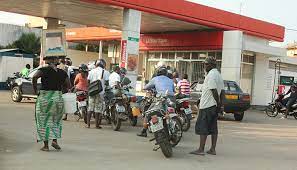The Cameroon Workers Forum (Cawof), which brings together around ten union confederations, denounced, on January 8, at the end of a meeting of union presidents, “the new increase in fuel prices which occurred on February 2, 2024 bringing the total cumulative increases in one year of more than 33%.”
The Cawof thus “totally” rejects the new prices set, according to its members “in an arbitrary manner” while the government justifies this second price increase, in the space of a year, by “the need to resolve the growing budgetary constraints faced by the State and to avoid tensions in the supply of petroleum products to the national market.” It must be said that according to the authorities, the subsidy intended to support the consumption of petroleum products reached 1,000 billion FCFA in 2022, before falling to 640 billion FCFA in 2023, thanks to the first increase in consumer prices. pump intervened on February 1, 2023.
Despite these explanations, the dozen union confederations members of Cawof “reserve the right to call on workers to mobilize for a general strike” in the absence of “a positive response from the government to the demands”. And already, Cawof is calling on departmental unions to “suspend their participation in all meetings concerning the organization of the 138th International Labor Day which could be boycotted if the demands of the union confederations are not taken into account”.
These are precisely the departmental unions of the Cameroon Trade Union Confederation of Workers, the Confederation of Autonomous Trade Unions of Cameroon, the Union of Free Trade Unions of Cameroon, the Cameroon Confederation of Workers Trade Union, the Confederation of National Accord of Cameroon Workers, the Confederation of United Workers of Cameroon, the Cameroon Confederation of Labor, the General Confederation of Cameroon Workers’ Unions, the General Confederation of Labor-Liberty, the Central Trade Union of the Public Sector and the Confederation of Independent Trade Unions of Cameroon.
Since February 3, new prices have been applied at the pump, by decision of the government. The liter of super now costs 840 FCFA compared to 730 FCFA previously, while the liter of diesel has increased to 828 FCFA, compared to 720 FCFA previously. The increase made is of the order of 15% compared to the prices hitherto practiced, i.e. 110 FCFA and 108 FCFA increase respectively. A situation denounced by Cawof member unions. These point to increases which come on top of tax constraints imposed by the 2024 finance law and “liberal policies carried out for several decades (which) have gradually and inexorably diluted the purchasing power of workers”.
To preserve purchasing power, the government plans, as last year, to implement support measures in the short term. This involves the 5% increase in the basic salary of public officials, the opening of dialogue with the private sector on the Smig (it is 41,875 FCFA in the public and 60,000 FCFA in the private sector), reduction of certain tax and customs charges in the road transport sector.
“The government will do everything possible so that Cameroonian users can live properly. Because we are in a perspective of decent work (…). We are available to the social partners to whom we have already asked to make proposals on which we will work,” reassures the Minister of Labor and Social Security. Grégoire Owona spoke on February 6 at a press conference organized by the government on the increase in fuel prices.
SBBC

